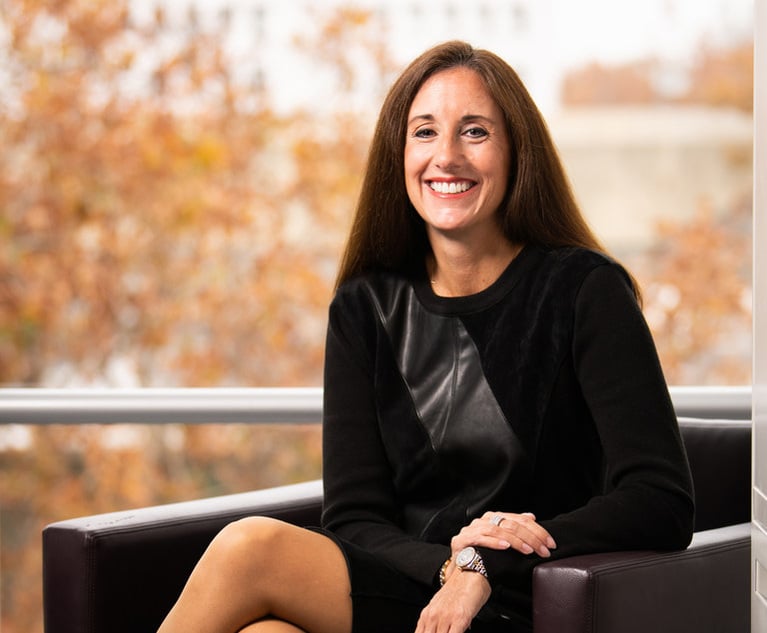 Raychel Lean, Florida Bureau Chief at ALM Media. Credit: Nicole Lean.
Raychel Lean, Florida Bureau Chief at ALM Media. Credit: Nicole Lean. I've Lived in Poverty. Here's Why We Should All Care About Miami's Affordability Crisis
If it hadn't been for a handful of people who had my back, I would have been homeless.
August 17, 2022 at 11:58 AM
7 minute read
CommentaryMy standout memory from my early 20s is leaving the job I was fired from after just three days because the HR manager didn't believe my work permit was legitimate (It was).
Before I left to cry in my car, the editor went into his wallet to give me some cash for the time I'd already worked. He felt bad that the place I was staying—a mattress in a friend's empty living room—had no electricity because the bill was overdue.
But I didn't really care about that.
I'd just been excited to work as a reporter for a financial publication in South Florida, albeit a small one. It would take me another four years to get a reporting job and start my career. And as an immigrant from the U.K. trying to support myself in the U.S., I was in for a tough four years.
The temporary work visa I'd secured after graduating from Barry University in Miami Shores was a blessing and a curse. It gave me permission to work for one year, but only in a field directly related to my writing degree. Oh, and I'd only be granted a social security number after getting a job (yeah, good luck trying to explain that to HR.)
If it hadn't been for a handful of people who had my back, I would have been homeless.
After several months, I and my then-boyfriend, now-husband, moved into a North Miami efficiency, which is marketing speak for a room in someone's house that doesn't have a kitchen or basically any space to swing a cat.
We washed our dishes in the bathroom sink and "cooked" our food in a mini toaster oven. Our trash can was a plastic bag that hung from the doorknob and we slept on an air mattress with a tiny hole in it, which required topping up with a hairdryer each night. We lived off buy-one-get-one deals, and I kept every Pollo Tropical and Boston Market receipt I could just to fill in the survey and get a discount next time. I didn't own a phone.
Every day presented a choice between turning the air conditioning unit on and dealing with its incessant dripping and brain-rattling noise, or switching it off and getting a headache from the heat.
Efficiencies like that are now easily going for more than $1,000 a month in Miami.
I have literally done the cliché rummage through couch cushions in search of coins to pay for gas because I didn't have enough money to get to my part-time job at a tutor center. I've struggled to make car insurance and registration payments on time and been pulled over, which resulted in monetary fines. Then, when that car broke down and I sold it for parts, I switched to a bicycle—until that bicycle was stolen.
One night we were robbed on the street, and after the guy got out of jail (not enough evidence to press charges) I'd see him on my regular trips to Aldi because we lived within blocks of each other. Another time my husband fainted at work after calling out sick but being pressured to go in anyway. He fell from the top of a shelf in a retail store and broke his elbow.
Eventually, after adjusting my immigrant status once I was married and getting a different work permit, I was able to work without restrictions. I almost got a job at an English language academy but they declined because my British accent wasn't what they were looking for. Instead, I became a night shift supervisor at a Starbucks for $11 an hour and we moved to a different efficiency in Aventura, a better neighborhood.
Later, I heard about a litigation reporter position with ALM. Now I'm Florida Bureau Chief, overseeing the Daily Business Review publication. And my husband, after beginning his career at a liquor store, now manages a major winery's luxury portfolio for the South Florida region.
We live in an actual apartment.
I share this not because our situation was unique, or even that bad when you compare it to what many people go through.
I share it because it bothers me that if that situation was playing out for us right now, it would be a whole lot worse. And it is for so many people. There are countless Miami residents who are barely getting by, who'd make great contributions to whatever field they're interested in—if given the chance.
That period of our lives shaped us in many ways. But most crucially it made us empathetic leaders, hyper-aware of how pure circumstance can play an outsized role in the way people are perceived and the opportunities to which they're exposed.
We truly don't care if a colleague or a job applicant went to a prestigious school or not, because we know that doesn't reveal what's important about them. And if they're inexperienced, that doesn't mean they have nothing to contribute. Their attitude, their work ethic, their creativity, their empathy—that stuff is the fire in their belly. The stuff they didn't learn in school.
Some of the people we crossed paths with during those four years were unkind because they looked down on us, or simply just didn't care enough to ask how we were doing when they were in a position to help.
But we also met people who made us feel like we could keep going. They were generous and inspiring. They shared our excitement when we told them our ambitions. Some were also going through their own struggles. Some have since achieved what they wanted to in life, and some have not.
Others have had to move to the outskirts of the county or even out of state after their rent recently went up by as much as $1,000 a month.
Hiding It Well
The community we live in has a dire need for affordable housing, but it makes more business sense to create sexy high-rise buildings that can serve as holiday homes for the ultra-wealthy. It's a good thing that Miami is booming and that so many businesses are realizing its potential, but that doesn't make it OK to leave less affluent residents behind.
There are people out there who are fighting every day, who have to jump through more hoops than most just to achieve the same outcome, and they're only one or two disasters away from experiencing a mental health emergency, being homeless or both.
Many of them are hiding it well.
For a long time, this story was private to me because I didn't want to be judged, but now I see the value in sharing it.
These are issues we need to talk about, and the unprecedented attention on this region provides opportunities to act.
As a professional in South Florida's legal, real estate or business community, you can always make more room at the table. I don't think it's about doing anyone a favor, but recognizing their worth.
It might just pay off for you, and I guarantee it will mean the world to the person for whom you make room.
NOT FOR REPRINT
© 2025 ALM Global, LLC, All Rights Reserved. Request academic re-use from www.copyright.com. All other uses, submit a request to [email protected]. For more information visit Asset & Logo Licensing.
You Might Like
View All
EB-5 Rebounds After a Rocky Year: Challenges of 2024 Lay Groundwork for a Booming 2025

Leveraging the Power of Local Chambers of Commerce: A Second-Career Lawyer’s Guide to Building a Thriving Practice
5 minute read
CFPB Proposes Rule to Regulate Data Brokers Selling Sensitive Information
5 minute read
Shifting Battlegrounds in Administrative Law, From Biden to Trump II
Trending Stories
- 1'Shame on Us': Lawyer Hits Hard After Judge's Suicide
- 2Upholding the Integrity of the Rule of Law Amid Trump 2.0
- 3Connecticut Movers: New Laterals, Expanding Teams
- 4Eliminating Judicial Exceptions: The Promise of the Patent Eligibility Restoration Act
- 5AI in Legal: Disruptive Potential and Practical Realities
Who Got The Work
J. Brugh Lower of Gibbons has entered an appearance for industrial equipment supplier Devco Corporation in a pending trademark infringement lawsuit. The suit, accusing the defendant of selling knock-off Graco products, was filed Dec. 18 in New Jersey District Court by Rivkin Radler on behalf of Graco Inc. and Graco Minnesota. The case, assigned to U.S. District Judge Zahid N. Quraishi, is 3:24-cv-11294, Graco Inc. et al v. Devco Corporation.
Who Got The Work
Rebecca Maller-Stein and Kent A. Yalowitz of Arnold & Porter Kaye Scholer have entered their appearances for Hanaco Venture Capital and its executives, Lior Prosor and David Frankel, in a pending securities lawsuit. The action, filed on Dec. 24 in New York Southern District Court by Zell, Aron & Co. on behalf of Goldeneye Advisors, accuses the defendants of negligently and fraudulently managing the plaintiff's $1 million investment. The case, assigned to U.S. District Judge Vernon S. Broderick, is 1:24-cv-09918, Goldeneye Advisors, LLC v. Hanaco Venture Capital, Ltd. et al.
Who Got The Work
Attorneys from A&O Shearman has stepped in as defense counsel for Toronto-Dominion Bank and other defendants in a pending securities class action. The suit, filed Dec. 11 in New York Southern District Court by Bleichmar Fonti & Auld, accuses the defendants of concealing the bank's 'pervasive' deficiencies in regards to its compliance with the Bank Secrecy Act and the quality of its anti-money laundering controls. The case, assigned to U.S. District Judge Arun Subramanian, is 1:24-cv-09445, Gonzalez v. The Toronto-Dominion Bank et al.
Who Got The Work
Crown Castle International, a Pennsylvania company providing shared communications infrastructure, has turned to Luke D. Wolf of Gordon Rees Scully Mansukhani to fend off a pending breach-of-contract lawsuit. The court action, filed Nov. 25 in Michigan Eastern District Court by Hooper Hathaway PC on behalf of The Town Residences LLC, accuses Crown Castle of failing to transfer approximately $30,000 in utility payments from T-Mobile in breach of a roof-top lease and assignment agreement. The case, assigned to U.S. District Judge Susan K. Declercq, is 2:24-cv-13131, The Town Residences LLC v. T-Mobile US, Inc. et al.
Who Got The Work
Wilfred P. Coronato and Daniel M. Schwartz of McCarter & English have stepped in as defense counsel to Electrolux Home Products Inc. in a pending product liability lawsuit. The court action, filed Nov. 26 in New York Eastern District Court by Poulos Lopiccolo PC and Nagel Rice LLP on behalf of David Stern, alleges that the defendant's refrigerators’ drawers and shelving repeatedly break and fall apart within months after purchase. The case, assigned to U.S. District Judge Joan M. Azrack, is 2:24-cv-08204, Stern v. Electrolux Home Products, Inc.
Featured Firms
Law Offices of Gary Martin Hays & Associates, P.C.
(470) 294-1674
Law Offices of Mark E. Salomone
(857) 444-6468
Smith & Hassler
(713) 739-1250






